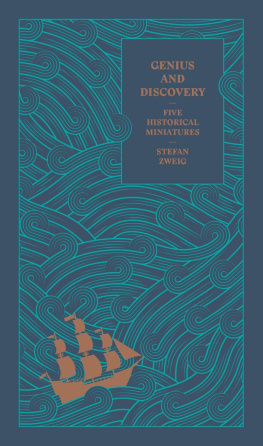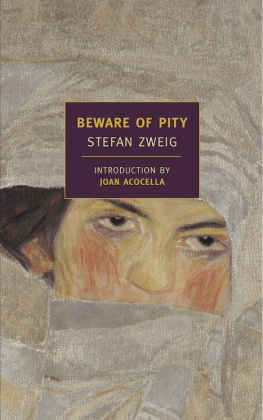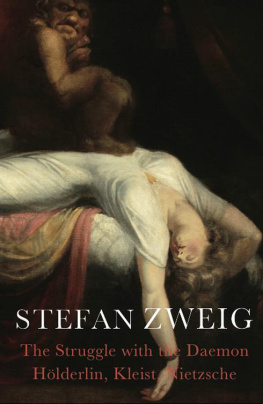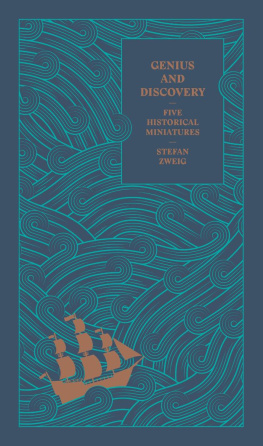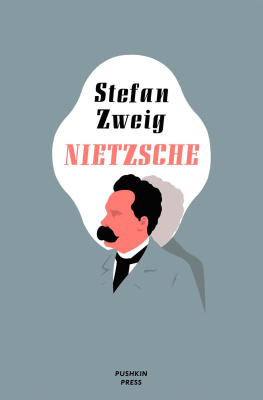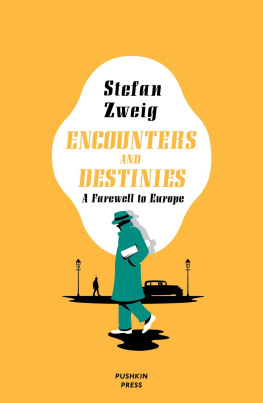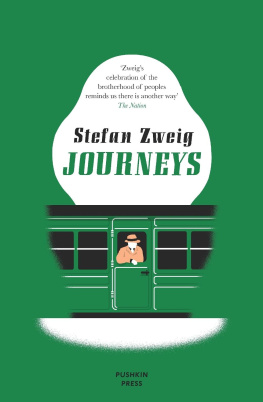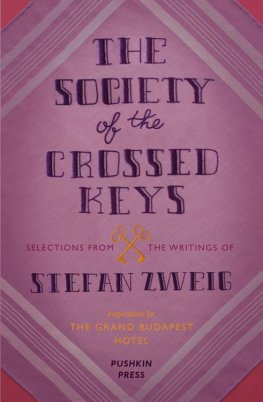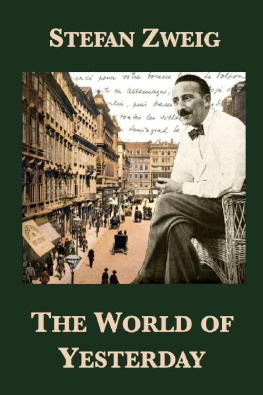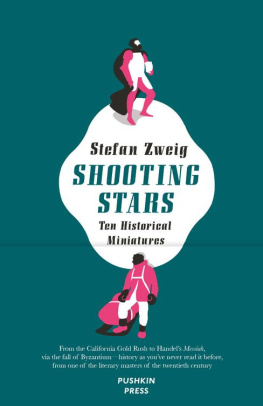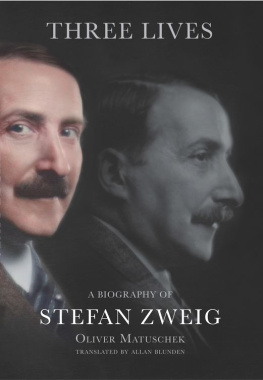Stefan Zweig - Genius and Discovery
Here you can read online Stefan Zweig - Genius and Discovery full text of the book (entire story) in english for free. Download pdf and epub, get meaning, cover and reviews about this ebook. year: 2016, publisher: Steerforth Press, genre: Detective and thriller. Description of the work, (preface) as well as reviews are available. Best literature library LitArk.com created for fans of good reading and offers a wide selection of genres:
Romance novel
Science fiction
Adventure
Detective
Science
History
Home and family
Prose
Art
Politics
Computer
Non-fiction
Religion
Business
Children
Humor
Choose a favorite category and find really read worthwhile books. Enjoy immersion in the world of imagination, feel the emotions of the characters or learn something new for yourself, make an fascinating discovery.
- Book:Genius and Discovery
- Author:
- Publisher:Steerforth Press
- Genre:
- Year:2016
- Rating:3 / 5
- Favourites:Add to favourites
- Your mark:
- 60
- 1
- 2
- 3
- 4
- 5
Genius and Discovery: summary, description and annotation
We offer to read an annotation, description, summary or preface (depends on what the author of the book "Genius and Discovery" wrote himself). If you haven't found the necessary information about the book — write in the comments, we will try to find it.
Genius and Discovery — read online for free the complete book (whole text) full work
Below is the text of the book, divided by pages. System saving the place of the last page read, allows you to conveniently read the book "Genius and Discovery" online for free, without having to search again every time where you left off. Put a bookmark, and you can go to the page where you finished reading at any time.
Font size:
Interval:
Bookmark:
Gems of literary perfection... Such lucid, liquid prose
Simon Winchester
Zweigs accumulated historical and cultural studies remain a body of achievement almost too impressive to take in
Clive James
The perfect stocking-filler
Philosophy Football
N O ARTIST is an artist through the entire twenty-four hours of his normal day; he succeeds in producing all that is essential, all that will last, only in a few, rare moments of inspiration. History itself, which we may admire as the greatest writer and actor of all time, is by no means always creative. Even in Gods mysterious workshop, as Goethe reverently calls historical knowledge, a great many indifferent and ordinary incidents happen. As everywhere in life and art, sublime moments that will never be forgotten are few and far between. As a chronicler, history generally does no more than arrange events link by link, indifferently and persistently, fact by fact in a gigantic chain reaching through the millennia, for all tension needs a time of preparation, every incident with any true significance has to develop. Millions of people in a nation are necessary for a single genius to arise, millions of tedious hours must pass before a truly historic shooting star of humanity appears in the sky.
But if artistic geniuses do arise, they will outlast their own time; if such a significant hour in the history of the world occurs, it will decide matters for decades and centuries yet to come. As the electricity of the entire atmosphere is discharged at the tip of a lightning conductor, an immeasurable wealth of events is then crammed together in a small span of time. What usually happens at a leisurely pace, in sequence and due order, is concentrated into a single moment that determines and establishes everything: a single Yes, a single No, a Too Soon or a Too Late makes that hour irrevocable for hundreds of generations while deciding the life of a single man or woman, of a nation, even the destiny of all humanity.
Such dramatically compressed and fateful hours, in which a decision outlasting time is made on a single day, in a single hour, often just in a minute, are rare in the life of an individual and rare in the course of history. In this book I am aiming to remember the hours of such shooting starsI call them that because they outshine the past as brilliantly and steadfastly as stars outshine the night. They come from very different periods of time and very different parts of the world. In none of them have I tried to give a new colour or to intensify the intellectual truth of inner or outer events by means of my own invention. For in those sublime moments when they emerge, fully formed, history needs no helping hand. Where the muse of history is truly a poet and a dramatist, no mortal writer may try to outdo her.

IMMORTALITY

THE DISCOVERY OF
THE PACIFIC OCEAN

25 September 1513
When he first returned from the newly discovered continent of America, Columbus had displayed countless treasures and curiosities on his triumphal procession through the crowded streets of Seville and Barcelona: human beings of a race hitherto unknown, with reddish skins; animals never seen before; colourful, screeching parrots; slow-moving tapirs; then strange plants and fruits that would soon find a new home in EuropeIndian corn, tobacco, the coconut. The rejoicing throng marvels at all these things, but the royal couple and their counsellors are excited above all by a few boxes and baskets containing gold. Columbus does not bring much gold back from the new Indies: a few pretty things that he has bartered with the natives, or stolen from them, a few small bars and several handfuls of loose grains, gold dust rather than solid goldthe whole of it at most enough to mint a few hundred ducats. But the inspired Columbus, who always fanatically believes whatever he wants to believe at any given time, and who has been so gloriously proved right about his sea route to India, boasts effusively and in all honesty that this is only a tiny foretaste. Reliable news, he adds, has reached him of gold mines of immeasurable extent on these new islands; only just below the surface, the precious metal, he says, lies under a thin layer of soil in many fields, and you can easily dig it out with an ordinary spade. Farther south, however, there are realms where the kings drink from golden goblets, and gold is worth less than lead at home in Spain. The ever-avaricious king listens, intoxicated to hear of this new Ophir that now belongs to him. No one yet knows Columbus and his sublime folly well enough to doubt his promises. A great fleet is fitted out at once for the second voyage, and now there is no need for recruiting officers and drummers to find men to join it. Word of the newly discovered Ophir, where you can pick up gold from the ground with your bare hands, sends all Spain mad; people come in their hundreds, their thousands to travel to El Dorado, the land of gold.
But what a dismal tidal wave of humanity is now cast up by greed from every city, every village, every hamlet. Not only do honourable noblemen arrive, wishing to gild their coats of arms, not only are there bold adventurers and brave soldiers; all the filthy scum of Spain is also washed up in Palos and Cdiz. There are branded thieves, highwaymen and footpads hoping to find a more profitable trade in the land of gold; there are debtors who want to escape their creditors and husbands hoping to get away from scolding wives; all the desperadoes and failures, branded criminals and men sought by the Alguacil justices volunteer for the fleet, a motley band of failures who are determined that they will make their fortunes at long last, in an instant too, and to that end are ready to commit any act of violence and any crime. They have told one another the fantasies of Columbus, repeating that in those lands you have only to thrust a spade into the ground to see nuggets of gold glinting up at you, and the prosperous among the emigrants hire servants and mules to carry large quantities of the precious metal away. Those who do not succeed in being taken on by the expedition find another way: never troubling to get the royal permission, coarse-grained adventurers fit out ships for themselves, in order to cross the ocean as fast as they can and get their hands on gold, gold, gold. And at a single stroke, Spain is rid of troublemakers and the most dangerous kind of rabble.
The Governor of Espaola (later San Domingo and Haiti) is horrified to see these uninvited guests overrunning the island entrusted to his care. Year after year the ships bring new freight and increasingly rough, unruly fellows. The newcomers, in turn, are bitterly disappointed. There is no sign of gold lying loose on the road, and not another grain of corn can be got out of the unfortunate native inhabitants on whom these brutes descend. So hordes of them wander around, intent on robbery, terrifying the unhappy Indios and the governor alike. The latter tries in vain to make them colonists by showing them where land may be had, giving them cattle, and indeed ample supplies of human cattle in the form of sixty to seventy native inhabitants as slaves to work for every one of them. But neither the high-born hidalgos nor the former footpads have a mind to set up as farmers. They didnt come here to grow wheat and herd cattle; instead of putting their minds to sowing seed and harvesting crops, they torment the unfortunate Indiosthey will have eradicated the entire indigenous population within a few yearsor sit around in taverns. Within a short time most of them are so deep in debt that after their goods they have to sell their hats and coats, their last shirts, and they fall into the clutches of traders and usurers.
Font size:
Interval:
Bookmark:
Similar books «Genius and Discovery»
Look at similar books to Genius and Discovery. We have selected literature similar in name and meaning in the hope of providing readers with more options to find new, interesting, not yet read works.
Discussion, reviews of the book Genius and Discovery and just readers' own opinions. Leave your comments, write what you think about the work, its meaning or the main characters. Specify what exactly you liked and what you didn't like, and why you think so.

